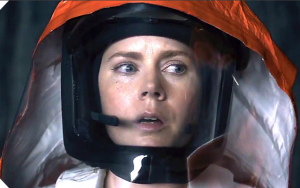ARRIVAL: 3 ½ STARS. “offered the audience a story that is both spacey and grounded.”
 In “Arrival,” a new humanistic sci fi film from future “Blade Runner” director Denis Villeneuve, Amy Adams plays a woman who sees life on a fractured timeline, like a Tarantino movie where the beginning is the end and the end is the start.
In “Arrival,” a new humanistic sci fi film from future “Blade Runner” director Denis Villeneuve, Amy Adams plays a woman who sees life on a fractured timeline, like a Tarantino movie where the beginning is the end and the end is the start.
Adams is Dr. Louise Banks, a linguist recruited by the U.S. Military to communicate with giant alien heptapods—think Kang and Kodos from “The Simpsons”— who have landed in Montana and eleven other sites worldwide. Are they scientists, tourists or warriors?
“What do they want?” asks Colonel Weber (Forest Whitaker). “Where are they from?”
With voices that sound like a Didgeridoo mixed with an out-of-tune electronic tuba and a written language that resembles “The Ring” logo, no answers are immediately forthcoming. Working with theoretical physicist Ian Donnelly (Jeremy Renner) Banks slowly forms a bond with the multi-legged ETs. In return she receives a gift from them that changes everything.
“War of the Worlds” this is not. Based on the short story “Story of Your Life” by Ted Chiang, this is an alien invasion film with more in common with the heady sci fi of Andrei Tarkovsky and the crowd-pleasing emotionalism of Steven Spielberg’s “Close Encounters of the Third Kind.” It’s more about the importance of communication—“Language is the first weapon drawn in conflict.”—than alien technology or “Independence Day” style Martian marauding. It’s a deliberately paced, contemplative film that suggests an alternative to the old ethos of shooting first and asking questions later. Questions are asked, few are answered but the result is an intelligent but dreamy story that never lets the scene get in the way of the film’s emotional core.
That core is supplied by Adams. As Dr. Louise Banks she dominates the movie. Everyone else, including Renner and Whitaker, are basically window dressing for a performance that bristles with wonder, sadness and yes, even scientific method. Banks may be methodical but Adams isn’t. She wrings every bit of sentiment from a script that tries to balance its cool social accountability with a story that delves into the soul of its main character.
I can’t reveal more about how or why Banks goes about deciphering the alien intentions. The film plays with timelines and by the time the end credits roll “Arrival” has offered the audience an explanation that is both spacey and grounded.
